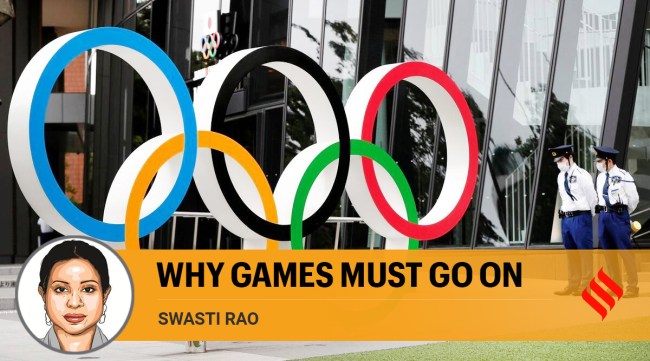Opinion Why Japan’s going ahead with Olympics
Swasti Rao writes: PM Suga cannot ignore the political, business and economic potential of the Olympic Games
 Hosting the Olympics has always been about national pride and prestige. For Suga, they would also seal his political fate at home with elections to the National Diet scheduled for October.
Hosting the Olympics has always been about national pride and prestige. For Suga, they would also seal his political fate at home with elections to the National Diet scheduled for October. Japan’s Prime Minister Yoshihide Suga has taken the final call. Even as the world reels under the second and third waves of the Covid-19 pandemic and a third of Japanese public opinion favours further postponement of the 2021 Summer Olympics and Paralympics, Suga is determined to host the Games in Tokyo next month.
In an unusual display of non-conformism, so uncharacteristic of Japanese official culture, Shigeru Omi, the government’s top advisor on Covid-19 publicly questioned the government’s decision to host the Games. Even until last weekend, Tokyo was under a state of emergency. Why then has Suga taken the plunge?
Hosting the Olympics has always been about national pride and prestige. For Suga, they would also seal his political fate at home with elections to the National Diet scheduled for October.
Apart from domestic politics, the shadow of global geopolitics has also always fallen on the Olympics. Japan first hosted the Games in 1964, barely two decades after its defeat in the Second World War, to announce its return to the world stage. This time Japan brings the Games back to Asia 13 years after China’s impressive staging in 2008. Given the competition for influence in the Asia-Pacific region, a grand staging of the Games is crucial both for Japanese morale and for its stagnating economy.
Given the geopolitics of the Olympic Games and the intense Sino-Japanese competition for influence in Asia, China’s reiteration of its decision to host the Winter Olympics in February 2022 also exerted pressure on Tokyo. It is, therefore, not surprising that at the recently concluded G-7 Summit at Cornwall, world leaders supported Suga’s plan to host the Games.
According to the latest opinion poll conducted by the Japan Broadcasting Corporation, NHK, 31 percent of the Japanese oppose the July Olympics, a sharp fall from 80 per cent earlier in the year. These numbers clinched the decision and Suga will use the Olympics to reinforce Japan’s message to Asia and the world that it will continue to matter as one of the world’s biggest economies and a technological and trading superpower.
Although not as charismatic as his former boss, Shinzo Abe, Suga prides himself on being a politician who “gets things done”. If executed well, the Olympics could boost his national standing. This is important for Suga given that the Japanese media has recently speculated about Abe considering a return to active politics. Suga may wait till the closure of the Paralympics on September 5 before dissolving the House of Representatives and calling for general elections. Many Japanese PMs have taken political advantage of their power to dissolve the lower House at a time that maximises electoral gains. There is no reason why Suga will not do so as well.
What explains Suga’s confidence in taking the risk of hosting the Olympics during a pandemic? After all, it will be a make-or-break political decision for him. Clearly, Japan has fared much better than most countries when it comes to managing the pandemic. With a 98 per cent recovery rate, 14,439 deaths so far and the average number of new infections reported each day falling by more than 2,100 over the last three weeks, Japan looks steady. After a sluggish start, the vaccination drive has picked up and is proceeding apace.
While presently only 12 per cent of the population has been vaccinated, Chief Cabinet Secretary Kato Katsunobu has stated that Japan is progressing towards its goal of administering 1 million Pfizer and Moderna vaccine doses each day. With this projection, they hope to vaccinate around 30 per cent of the population by the time the Games start in July and 40 per cent by August. Japanese Olympic Committee President Yasuhiro Yamashita has said that about 95 per cent of Japanese athletes competing at the Tokyo Olympics are expected to be vaccinated as a sign of Japanese omotenashi (hospitality).
However, on a global level Japan’s vaccination drive is not only behind developed countries, but the world as a whole. This explains Japan’s recent fervent push for vaccination. Japanese leadership has been making the point that while the Covid-19 virus originated in China, Japan has shown the determination to fight the virus in the same manner that it liberated itself from the Fukushima Daiichi nuclear disaster in 2011.
Suga also couldn’t ignore the business and economic potential of the Olympics. If Japan had cancelled the Games it would not only have to fork out a lot of money to the International Olympic Committee (IOC) but would risk the wrath of global firms that have already invested in them. Japan had originally estimated that the games would cost $7.7 billion, which has officially doubled with government expenditure reaching $15.4 billion. Official audits suggest it could be twice as much. A year’s delay and pandemic countermeasures alone have already raked up expenditure by $ 3 billion. Japanese advertising giant Dentsu Inc has raised more than $3 billion from local sponsors. Estimates suggest that a cancellation could cost the IOC $3 billion-$4 billion in lost broadcast rights income. Broadcast income and sponsors account for 91 per cent of the IOC income. The Olympics have always been about more than sport, but in 2021, for Suga and Japan this is even more true.
This column first appeared in the print edition on June 29, 2021 under the title ‘Why Games must go on’. The writer teaches at the Department of Strategic and Security Studies, Aligarh Muslim University







